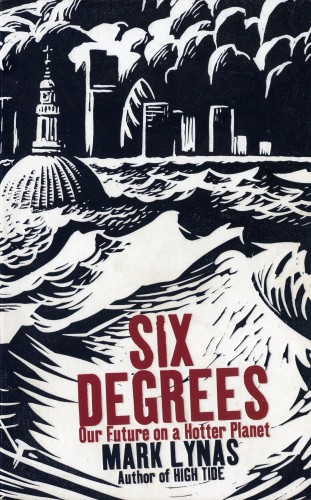The Age of Stupid is not some flight of fancy. It’s sobering to realise that the frightening scenarios presented in this 2009 feature film are firmly rooted in real, current scientific research. [21 August 2009 | Peter Boyer]
Remarks to the audience before the Tasmanian premiere of The Age of Stupid, State Cinema, Hobart, Friday 21 August 2009
The film you’re about to see is based on a book called Six Degrees: Our future on a hotter planet , written by a journalist, Mark Lynas, and published in 2007.
What set Six Degrees apart from others of its kind was that all of the scenarios it presented were outcomes of global warming described in published, peer-reviewed science. So the scenes depicted in this film are not somewhere on the outer fringe of extreme science fiction. They are firmly rooted in real, current scientific research.
Of all the myriad species inhabiting Spaceship Earth, so far as we know only specimens of Homo sapiens have the ability to look into the future. Included in this is the knowledge that we are going to die.
I see this ability and this knowledge as a gift. Some people don’t. Some believe that you can know too much, but I’m not one of them. So to me it’s a gift. If you’re religious you could say that it’s a gift from God.
We will be squandering this gift, and losing a vital, perhaps final, opportunity to restore our precious biosphere to health, if we ignore the findings of science that form the basis of this film. I hope that viewing it will leave you not disheartened, but strengthened in your resolve to go out and change the world. With enough of us out there, it can and will be changed.
I commend to you The Age of Stupid, and I applaud Sustainable Living Tasmania and the State Cinema for enabling Tasmanians to see it tonight and over the coming week.
Note after the event: This film isn’t going to heal any wounds or make you feel good. It’s a strong condemnation of pretty well the entire structure and direction of Western economic “progress” since the Second World War, as it grows into a juggernaut that in 2009 is threatening to flatten us. Looking back from 2055, amid the ruins of a world unable to deviate from business as usual, we see more clearly the opportunities missed amid the mad consumerism of the early years of the 21st century. The Age of Stupid challenges its viewing audience to rise above self-pity, get out into the world and start to change it. This is a tough call, but one we have to respond to. Meek surrender is not an option.


Wow, this is a really powerful film, but it is probably not for everyone.
By way of comparison, the medical profession has experienced long internal debates about whether or not to give patients truthful prognoses when that prognosis is really bad news – meaning life threatening, personally confronting, perhaps terminal. And medical practice has changed as a result of those debates, generally in favour of delivering the truth.
We now face the same dilemma / debate on a much larger planetary scale, and I have generally concluded we should accept the accepted practice of modern medical – in nearly all circumstances tell the really bad news truthfully and with due warnings, but with as much back-up support as possible – to avoid the patient (recipient) losing heart, or going into a morbid state of depression.
In many cases giving a hard jolt is the only way to get a patient to respond. Yet to do so and then let them just go home and stew over it is often counterproductive to the patient’s wellbeing. That’s the delicate bit.
The whole planet is now suffering, like so many patients (from abuse, alcohol, smoking, too much food, lack of exercise) from life threatening prognoses and, just like the high-risk patient, we are all having to confront shocking news to jolt us out of our complacency.
But I already know of one person who reacted very badly to the film. Many ‘heart’ people find it very hard to cope with really negative news.
I find this a huge dilemma, but am also conscious of the ‘cognitive dissonance’ that enables most of us to know one thing but do another. To not act in accordance with our beliefs. To just go on flying in jet planes and such – as if all is well’ knowing all the while that we personally are killing the planet.
It seems we really need to have a good kick up the pants. So the film, for all its risks, is good medicine for most of us. Let’s just keep an eye on all the amazing good things that are happening, then go and see the film and know what is in store if we don’t join in with this amazing adventure.